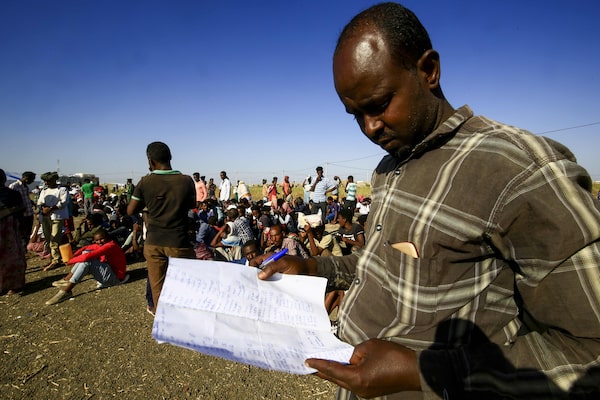
A man registers Ethiopian refugees, who fled the fighting in Tigray Region, at a border reception centre (Village 8) in Gedaref State, eastern Sudan, on Nov. 29, 2020.ASHRAF SHAZLY/AFP/Getty Images
A day after Ethiopia declared victory in its 25-day military march into the rebellious Tigray region, reports from the war zone suggest the fighting is far from over and the battle is shifting to a guerrilla conflict.
Tigrayan television, claiming that Tigrayan forces had shot down an Ethiopian warplane, showed video images of burning airplane wreckage and a captured Ethiopian pilot to support the assertion. Tigrayan leaders also said their forces had regained control of the historic town of Aksum, which the Ethiopian military had captured weeks ago.
The reports were impossible to confirm, because Ethiopia has shut down all communications and barred any independent media from the region. But diplomats confirmed a separate report that Tigrayan missiles were fired at targets in neighbouring Eritrea on Saturday night, hours after Ethiopia’s proclamation of victory.
The rocket attack, which led to six reported explosions in Eritrea’s capital, Asmara, showed that the rebels still retained an arsenal of heavy weapons and the capacity to use them.
Ethiopian Prime Minister Abiy Ahmed announced on Saturday that his forces were “fully in control” of Tigray’s capital, Mekele, a city of about 500,000. This was the “last phase” of the military offensive, he said. “The main operation is successfully concluded.”
Mr. Abiy said his forces were now pursuing the “criminals” of the region’s long-ruling party, the Tigray People’s Liberation Front (TPLF), with the intention of arresting them and putting them on trial.
The TPLF, which had been Ethiopia’s dominant faction for nearly three decades before Mr. Abiy’s ascent to the Prime Minister’s post in 2018, has increasingly feuded with him over issues of regional autonomy and political power. It held a regional election in defiance of his orders this year.
The TPLF, with about 250,000 fighters at its command, has a long history of guerrilla warfare in Tigray’s mountainous terrain. It spearheaded a rebellion against Ethiopia’s Marxist regime in the 1970s and 1980s, finally ousting the regime in 1991, and then played a key role in a brutal war against Eritrea in the late 1990s.
Before the Ethiopian assault on Mekele, many observers had worried that the attack would be a bloodbath. Artillery shelling was reported in the city on Saturday morning, sparking fears of massive damage and injuries. It appears, however, that the TPLF chose to retreat from the city and continue the fight elsewhere.
Mr. Abiy’s victory declaration made no mention of civilian casualties in the city. But a detailed report on Sunday from the International Committee of the Red Cross made it clear that the assault had led to heavy casualties – including so many deaths that there was a shortage of body bags.
“Local hospitals and health facilities are running dangerously low on medical supplies,” the ICRC said.
At one major hospital in the city, Ayder Referral Hospital, about 80 per cent of the patients were suffering from trauma injuries because of the fighting, and the influx of wounded had forced the hospital to suspend many other medical services, the ICRC said.
It said the hospital was running out of body bags and food supplies.
“The hospital is running dangerously low on sutures, antibiotics, anti-coagulants, painkillers and even gloves,” said Maria Soledad, head of operations for the ICRC in Ethiopia, who was in Mekele on Sunday.
But the damage extends far beyond the regional capital. About 1,000 Eritrean refugees have trekked to Mekele to seek food because of problems at their camps in the town of Shire, the ICRC said.
A report last week by an ICRC field team described the damage in northern Amhara region and western Tigray, where about 2,000 people had fled to makeshift camps. “We came across a destroyed village,” the report said. “A house was burning. The area was completely deserted.”
Despite weeks of requests to the Ethiopian government, the United Nations has failed to obtain humanitarian access to Tigray to deliver food and other supplies, which are rapidly running out.
Nearly 45,000 refugees have crossed the border from Tigray into Sudan. But the flow of refugees has been sharply curtailed in recent days, with reports that Ethiopian troops are blocking their route.
Human-rights groups and refugees from Tigray have alleged that both sides have committed atrocities during the war, including the killing of hundreds of civilians. Ethiopian state television, in a report on Sunday, said 70 graves had been discovered in the town of Humera in Tigray, with some of the graves containing multiple bodies.
In total, thousands of civilians and soldiers have died since the fighting began in Tigray on Nov. 4, according to a report by the International Crisis Group, an independent organization.
“Ethiopia’s partners should continue to press the message that the answer to the country’s deep political fault lines will not come on the battlefield,” the Crisis Group said in a statement just before the Ethiopian assault on Mekele.
Dino Mahtani, deputy director of the Africa program at the Crisis Group, said on Sunday that the Ethiopian forces seem to have avoided “the worst-case scenario – a total bloodbath in Mekele.”
But a prolonged insurgency is still possible in Tigray, and governing the region will be difficult if other ethnic groups claim the right to disputed land in Tigray, he said on Twitter. Amhara militias have already been supporting the Ethiopian army offensive in Tigray.
Our Morning Update and Evening Update newsletters are written by Globe editors, giving you a concise summary of the day’s most important headlines. Sign up today.
 Geoffrey York
Geoffrey York